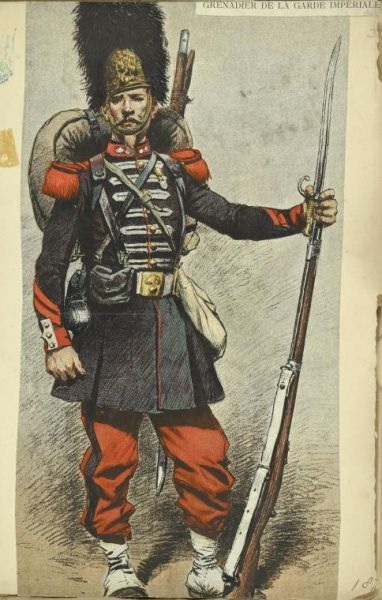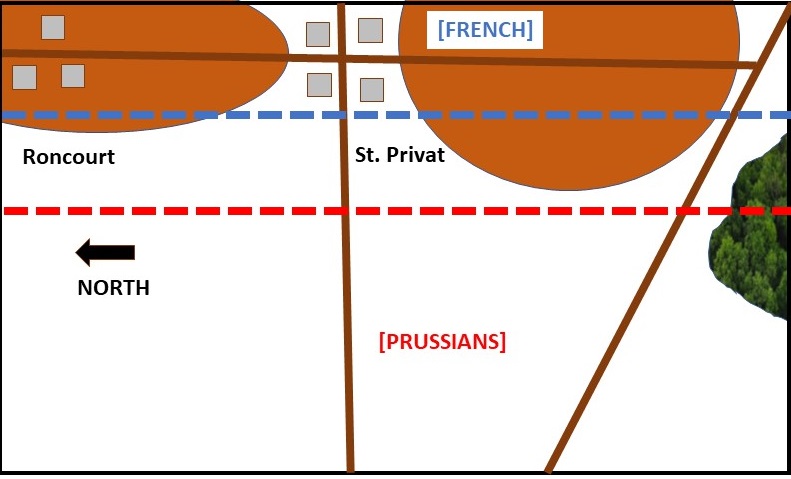St. Privat: Counter-Attack of the Imperial Guard
A " What-If" Scenario for La Guerre á Outrance


At Gravelotte-St. Privat, Bazaine declined to seriously commit the Imperial Guard, even though some critics point out that there were at least two points where such an action could have resulted in a decisive French victory. One of these possibilities occurred in front of Gravelotte, where Bourbaki, the Guard's commander, advised against sending in the guard to hit the decimated Prussians who had just assaulted across the Mance Ravine and been bloodily repulsed.
At the other end of the field, a similar action has taken place: unsupported by sufficient artillery, the Prussian Guard has assaulted up the slopes toward Roncourt and St. Privat, and been decimated. Historically, the French waited and allowed them to bring up artillery reserves and ultimately push the French back. A division of the Imperial Guard was committed, but not until night had nearly fallen, and it was too late.
But what if the Imperial Guard had been sent forward to capitalize on the initial repulse of the Prussian attack? Canrobert had been requesting this once he understood the weight of numbers being brought against him. This scenario explores this possibility, allowing for a likely committment: one division plus artillery of the Guard, Forton's cavalry division, and more aggressive orders to the French commander of VI Corps. (These units appeared after the French position had broken at the end of the day - here, they have been moved up to appear in a more timely fashion.)
The Prussian XII Corps is still largely intact, as is the remainder of the Guard (1st Brigade), supplemented by a few additional units from nearby formations. It is assumed that the historical orders to XII Corps to march northeast, around the end of the French line have been countermanded, and they are pulled back to assume a defensive role as the French mass for their counterattack.
The map below depicts the battlefield (4 x 6 table, 25mm "double" scale). The hills are smooth and provide no cover. The towns provide hard cover, and each will hold a single unit. The woods is rough and provides soft cover.

French will set up all of VI Corps and the reserve artillery anywhere to the east of the blue dotted line. Forton and Picard's divisions will march onto the table from the road in the southern corner starting on the first turn.
Prussians may set up anywhere west of the red dotted line. The only restriction is that von Rheinbaben's cavalry brigade must set up south of the southern-most road.
Canrobert (Overall Commander, VI Corps)
Artillery from the Army Reserve (1 base)
Tixier (Division Commander)
2 Brigades Line Infantry (4 bases)
Divisional Artillery (1 base)
Lafont (Division Commander)
2 Brigades Line Infantry (4 bases)
Divisional Artillery (1 base)
Levassor-Sorval (Division Commander)
2 Brigades Line Infantry (4 bases)
Divisional Artillery (1 base)
Forton (Division Commander)
2 Brigades Line Cavalry
Picard (Division Commander, 2nd Imperial Guard)
2 Brigades Guard Infantry (4 bases)
Divisional Artillery (2 bases)
Frederick Charles (Overall Commander, 2nd Army)
1st Guards Brigade (4 bases Guard Infantry)
1 Brigade Line Infantry (4 bases, from X Corps)
Artillery Reserve (1 base)
von Rheinbaben (Divisional Commander)
1 Line Cavalry Brigade (4 bases, from 5th Cavalry Division)
Albert of Saxony (Commander XII Corps)
von Montbé (Divisional Commander)
1 Brigade Guards Infantry (4 bases)
1 Brigade Line Infantry (4 bases)
Divisional Artillery (2 bases)
1 Regiment Line Cavalry (2 bases)
von Holderberg (Divisional Commander)
2 Brigade Line Infantry (each 4 bases)
Divisional Artillery (2 bases)
1 Regiment Line Cavalry (2 bases)
The game lasts 6 turns, from 6 PM until ´midnight. The Prussians must stop the French from exiting troops off the western table edge. If they do this, it is considered a Prussian victory. If the French can break through the Prussian line, it is a French victory.